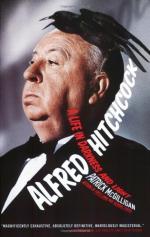|
This section contains 629 words (approx. 3 pages at 300 words per page) |

|
What Hitchcock has done in Topaz is exciting to anyone who believes that an artist's work has coherence, a progression, and a deepening of fundamental themes. (p. 17)
In Hitchcock's curious and largely unsuccessful Torn Curtain, a statement of some kind about modern political morality seemed to be competing with the personal story for significance. Hitchcock is not a socially-oriented director, though certain social motifs (especially fear of the police) trace back to the beginnings of his career. His movies almost invariably center around a man-woman relationship; whatever outward plot there is usually is no more than a counterpoint or a poetic extension of the basic theme.
Spies are a graphic metaphor for anarchy, for the underworld of organized society in which conventional morality becomes chaotic. Hitchcock's dread of psycho-sexual anarchy is always held in check by the highly schematized logic of his visual style—by his sense of...
|
This section contains 629 words (approx. 3 pages at 300 words per page) |

|


